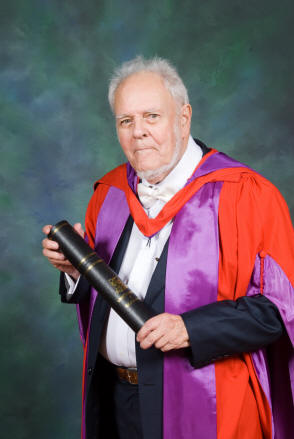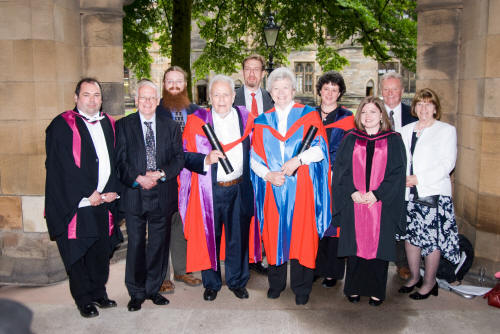|
Edited
by Frank R. Shaw, FSA Scot, Dawsonville, GA, USA
Email:
jurascot@earthlink.net
This
will be an easy introduction regarding a much beloved and respected Burns
scholar. Professor G. Ross Roy was recently recognized by the University of Glasgow with an honorary doctorate
degree. Before we learned of this honor, my wife and I had already planned
the Scottish “trip of a lifetime” with our family, including our two
grandchildren Ian and Stirling. Otherwise, had it been just the two of us, we
would have changed our plans to be present for the ceremony honoring Dr.
Roy. As it happened, he was on the way back the day we were travelling to Scotland…two
ships passing in the sky, you might conclude.
We did raise a glass of wine to him at 35,000 feet. Thomas Keith,
Burns scholar from New York City,
was fortunate to make the trip and represented a vast number of us who
wished we could have been present for the festivities.
 I
enlisted the help of Dr. Rhona Brown, who was present and who serves on the
faculty of the University
of Glasgow’s Scottish
Literature Department, to write the article below about the event. I deeply
appreciate her comments and think it is one of the better articles submitted
to our readers about a man who has been referred to as “The Chairman of the
Bard”. I hope you enjoy this
article as much as I did, and I hope you pass it along to others who have
respect and love for not only Robert Burns but for
G. Ross Roy as well.
(FRS: 7.30.09) I
enlisted the help of Dr. Rhona Brown, who was present and who serves on the
faculty of the University
of Glasgow’s Scottish
Literature Department, to write the article below about the event. I deeply
appreciate her comments and think it is one of the better articles submitted
to our readers about a man who has been referred to as “The Chairman of the
Bard”. I hope you enjoy this
article as much as I did, and I hope you pass it along to others who have
respect and love for not only Robert Burns but for
G. Ross Roy as well.
(FRS: 7.30.09)
The
Honorary Graduation of Professor G. Ross Roy
University
of Glasgow,
17 June 2009
[1]
Department of Scottish Literature,
University
of
Glasgow

In the year in which
Scotland
celebrates the 250th
anniversary of the birth of Robert Burns and Homecoming, it was particularly
apposite that Professor G. Ross Roy be honoured by the department of
Scottish Literature at the University
of Glasgow.
A distinguished scholar familiar to many students of English, Scottish,
Canadian, American and French literature, Professor Roy is, of course, most
important to the staff and students of Scottish Literature for his enormous
contribution to Burns studies. A tireless and avid collector of Burns
manuscripts, books and memorabilia, a meticulous editor, a gifted researcher
and a man always generous in his encouragement of fellow scholars, the
department is especially proud of its relationship with Professor Roy.
Professor Roy’s honorary graduation took place at the
University of
Glasgow’s
Commemoration Day on 17 June 2009. As a fairly new member of staff – I took
up my post as Lecturer in Scottish Literature in 2006 – it was my first
experience of this historical celebration. Beginning in the morning with a
service in the University’s Memorial Chapel to commemorate the institution’s
benefactors, the atmosphere of the entire day was appropriately formal and
yet festive. With all attendees in full academic dress, Professor Roy was
accompanied in the procession by his proposer, Dr. Gerry Carruthers, Head of
the Department of Scottish Literature and Director of the newly-established
Centre for Robert Burns Studies. After prayers and hymns, the Principal, Sir
Muir Russell, read the Roll of Benefactors and the Call to Commemoration.
Beginning with a remembrance of the University’s founder, William Turnbull,
Bishop of Glasgow, the congregation was reminded of the institution’s long
and esteemed history – amongst its early patrons are James II, Pope Nicholas
V, Mary, Queen of Scots, James VI, Charles I, Oliver Cromwell, Charles II,
Queen Anne, George III and Queen Victoria, as well as numerous individuals,
both eminent and unfamiliar. Although Burns himself appears to have had
little time for higher education – in an often-quoted stanza from the
‘Epistle to J. Lapraik, An Old Scotch Bard’, Burns refers to students as
‘dull, conceited Hashes’ while he exposes formal schooling’s ability to
confuse the brain and transform individuals who ‘gang
in Stirks, and
come out
Asses’! – the roll-call of benefactors set the
tone of the day, a day in which achievements, bequests and contributions
would be recognised.
Following the service was the graduation ceremony itself. Held in the
magnificent surroundings of the University’s Bute Hall, Professor Roy was
honoured alongside other graduands including Baroness Helena Kennedy, a QC
and Chair of the British Council, the Rt. Hon. George Reid, retired
Presiding Officer of the Scottish Parliament and MSP, Sir Kenneth Collins,
retired Chair of the Scottish Environmental Protection Agency, Professor
David Hirsh, Executive Vice President for Research at Columbia University,
Professor Ian McDougall, Emeritus Professor of the Research School of Earth
Sciences at Australia National University and Hannah Frank, artist and
sculptor, who sadly died shortly before the ceremony took place. On a
personal note, however, it was gratifying to see Professor Roy receive his
honorary degree alongside his long-standing friend and similarly prominent
figure in Burns studies, Jean Redpath, the renowned Scottish folk singer and
the voice of Serge Hovey’s arrangements of Burns’s songs. The University
Chapel Choir’s rendition of ‘My Love is like a Red, Red Rose’ gave the
ceremony a further Burnsian flavour, and both Professor Roy and Dr. Redpath
were delighted by the arrangement, which had been provided by a member of
the Choir. While Professor Roy’s achievements were recognised and respected
at the ceremony, there was an undoubted sense that Robert Burns’s works were
also being celebrated; I certainly found myself glancing up at the Bute
Hall’s stained glass window which depicts the poet holding a posy of
mountain daisies.
The graduation ceremony offered the audience a
personal insight into Professor Roy’s contribution to scholarship. In his
presentation to the Chancellor for the conferring of Professor Roy’s
honorary degree, Dr. Carruthers drew attention to Professor Roy’s scholarly
achievements in addition to his personality. After outlining his incredible
academic record – a BA from Concordia University in Montreal, an MA from the
University of Montreal, a Maitrise from the University of Strasbourg, a
doctorate in Comparative Literature from the University of Paris and a PhD
in English from the University of Montreal – Dr. Carruthers described
Professor Roy’s important early work on French-Canadian literature,
including his
Twelve Modern French-Canadian Poets
(1958). Great esteem, of course, was reserved for Professor Roy’s work in
Scottish literature. While recognised for his establishment of the
influential and indispensable academic journal,
Studies in
Scottish Literature in 1963, Professor Roy
was also acknowledged for his foundation, along with his wife Lucie, of the
W. Ormiston Roy Visiting Research Fellowship which has, since 1990, allowed
international scholars to visit and research the Scottish poetry collections
at the University of South Carolina during the summer vacation. This
library, made up by an enormous and generous donation from Professor Roy,
houses the finest and most significant collection of Robert Burns materials
in North America.
Professor Roy’s second edition of J. De Lancey Ferguson’s
Letters of
Robert Burns was singled out for special
praise, as were countless pieces which have contributed to a greater
understanding of Robert Burns and his work. Dr. Carruthers did, however,
draw attention to a comical incident in which Professor Roy’s
book-collecting fervour is illustrated, as well as his character. Professor
Roy had, some years ago, purchased in Scotland
an extremely rare edition of
The Merry Muses of Caledonia,
Burns’s compilation of bawdy songs. Worried that the book might be impounded
by US customs as pornography, Professor Roy craftily stocked up on Scottish
whisky, offering to pay the excess duty. In the confusion thus created, the
Customs official failed to notice the book in Professor Roy’s hand!
Dr.
Carruthers was also able to announce two pieces of news which will ensure
that the Department of Scottish Literature’s relationship with Professor Roy
will continue well into the future. Professor Roy has taken an Honorary
Fellowship with the Centre for Robert Burns Studies, housed in the
department and led by Dr. Carruthers. His affiliation and expertise is
invaluable to the Centre, which will produce, over the next decade and
beyond, a new, complete edition of Burns’s work. In addition, Dr. Carruthers
announced the forging of the ‘Ross Roy Medal’, a prize which will be awarded
to the best student essay in Scottish literature at a Scottish university.
This award, established with the cooperation of nine Scottish Universities
and the funding of the Scottish Arts Council, will be awarded annually from
2010, and is evidence of Professor Roy’s continuing support for young
scholars in an increasingly competitive academic world.

from left to right: Dr. Gerard Carruthers (Glasgow),
Prof. Ronald D. S. Jack (Edinburgh) , Edward Schmidt (South Carolina), Prof.
G. Ross Roy, Thomas Keith (New York), Dr. Jean Redpath, Dr. Kirsteen McCue
(Glasgow), Dr. Rhona Brown (Glasgow), Prof. Douglas Gifford (Glasgow), Mrs.
Kirsty Jack. Photos courtesy of
University of Glasgow Press.
The ceremony was followed by a lunch held in Hunter
Halls. As well as celebrating the honorary graduations, the meal was
attended, as is traditional, by the graduates of 50 years ago; on this
occasion, the class of 1959. The customary toasts were offered, while the
Rt. Hon. George Reid replied on behalf of the honorary graduates. Those in
attendance were delighted, however, when they were treated to an impromptu
performance by Jean Redpath, where she was in typically exquisite voice. At
the conclusion of the lunch, Professor Roy, Dr. Redpath and guests gathered
at the department of Scottish Literature for a champagne – and whisky! –
reception. Professor Douglas Gifford offered warm congratulations to
Professor Roy in his speech, singling out the journal
Studies in
Scottish Literature for particular praise.
Professor Roy and Dr. Redpath were introduced to the company by Dr.
Carruthers and Professor Marjorie Rycroft, a colleague from the Music
department, and were finally given an opportunity to respond to the words of
others. Characteristically humble, both were appreciative and humorous,
speaking of the welcoming atmosphere in Glasgow.
At the reception staff and students alike, many of
whom had spent years poring over Professor Roy’s work, had a chance to meet
him in person and to chat. As an eighteenth-century specialist myself, and
having grown up listening to Jean Redpath singing the songs of Burns, the
afternoon was a genuine pleasure. As Professor Roy was surrounded by friends
and admirers, the atmosphere was nothing short of convivial and, indeed,
Burnsian. It is clear that Professor Roy inspires real affection in those
who know him; a student from the
University
of South Carolina
had joined him as his escort, while Thomas Keith, a friend and fellow
Burnsian, had flown in from
New York
for the event. Although Professor Roy’s wife, Lucie, and his close friend
and colleague, Professor Patrick Scott, were unable to attend the ceremony,
they were often remembered in conversation. A pleasant and memorable day,
the honorary graduation was an apt way in which to celebrate Professor Roy’s
outstanding contribution to literary history and criticism, and in
particular to the field of Robert Burns studies. As I left the reception to
catch the Subway, I showed Professor Roy my commemorative ticket wallet,
which had been issued by Strathclyde Passenger Transport earlier in 2009 to
celebrate Burns’s anniversary and
Scotland’s
Homecoming. In green and blue plastic tartan, it is emblazoned with Burns’s
head and with the following celebrated lines from his ‘A Man’s a Man for A’
That’:
For a’
that, an’ a’ that,
It’s comin yet, for a’ that,
That Man to Man the warld o’er,
Shall brithers be for a’ that.
Having spent an incredibly busy but immensely
gratifying year talking about Burns, writing about Burns and attending
conferences on Burns, Professor Roy reminded me that research is all about
enthusiasm and passion. Showing him the ticket wallet, I said, ‘See? Burns
even appears on your travel wallet in Glasgow.
You can’t escape him!’ Professor Roy characteristically responded, ‘Why
would you want to?’
I am grateful to Dr.
Gerry Carruthers for his help in the preparation of this piece.
|

